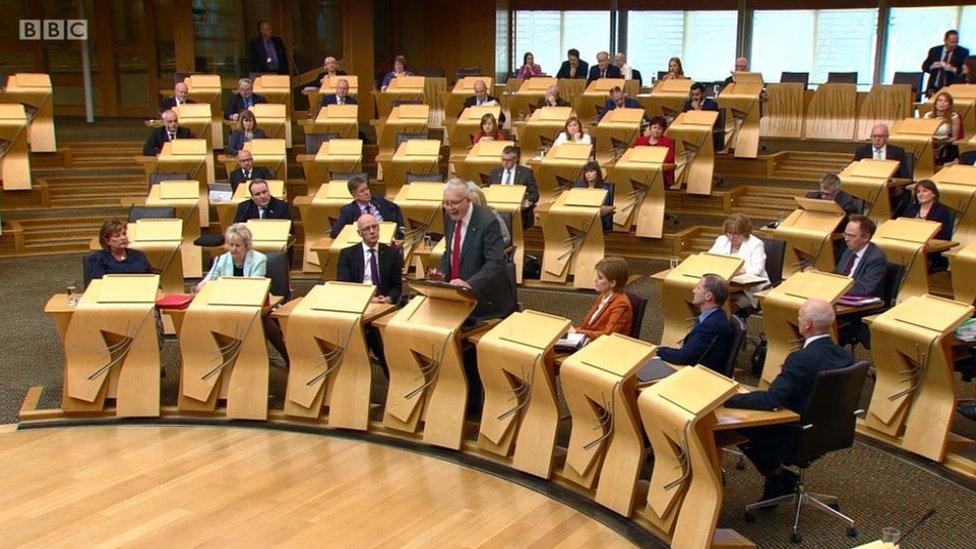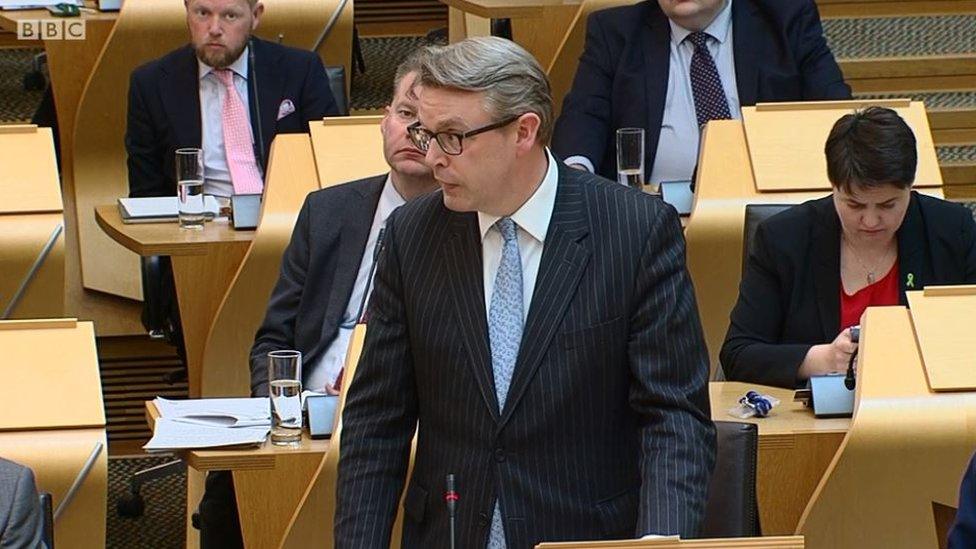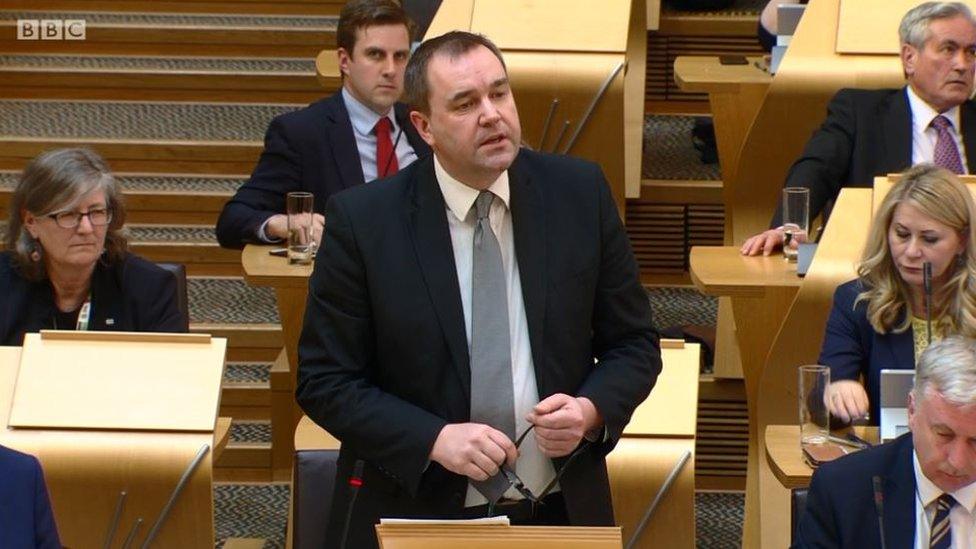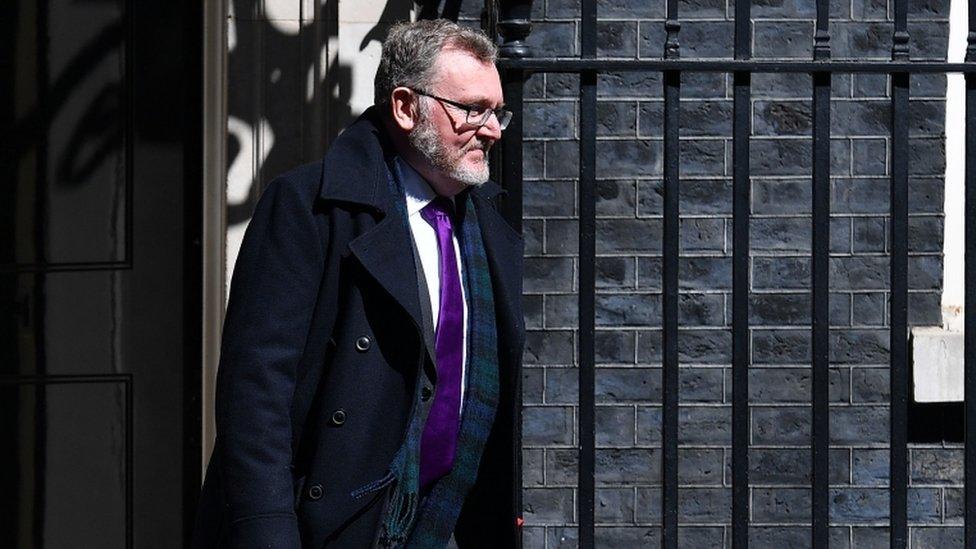Brexit powers row concerns future of devolution
- Published

Mike Russell led off the debate at Holyrood
While broadcasting to an astonished nation on the wireless in the middle of the night - OK, it was early morning but it felt nocturnal, despite the zealous dawn - my thoughts turned to literature.
Perhaps rashly, I gave vent to these musings. I forecast that today's legislative consent motion at Holyrood would indeed result in eventual drama - but perhaps of the Pinter/Beckett variety, rather than Shakespeare/Webster.
By this, I meant that there would be prolonged longueurs as in the works of the twentieth century masters - rather than the pace of the Bard of Avon (exit, pursued by a bear) or the two murders a scene associated with Webster, the Jacobean dramatist, who was said to be "much possessed by death".
Meanwhile back on earth. The LCM debate at Holyrood was lively, thoughtful and fascinating. It concerns real parliamentary powers affecting real people and real business. Farming, fishing, food and much more.
Nevertheless, it has yet to disturb the populace over-much; the electorate being much too savvy.
Neither has it produced contumely for either the Scottish or UK governments, despite the efforts of each side at various points.
That is not, repeat not, repeat not, to suggest that it is irrelevant. This debate is fundamental to the future of devolution. Just that it is unlikely to bring les citoyens to the barricades any time soon.
In the debate this afternoon, Mike Russell, the Minister for Mitigating Brexit, spoke gravely and well. If he is frustrated by the lack of progress, he kept it reasonably well hidden.
There was no objection, he argued, to creating post Brexit UK frameworks on matters such as farm subsidies. But those must be created by consent - not, potentially, by dictat, however much UK ministers promised to seek consensus.

Adam Tomkins spoke up in favour of consent
He cited Donald Dewar, the first Labour first minister, throughout his remarks: an evident sign that he was seeking to defend devolution, not advance the cause of independence.
Adam Tomkins, for the Conservatives, noted that the bulk of the powers in question were, for the most part, to be returned to Holyrood, being presently in Brussels.
In 24 cases, it was felt necessary to reserve these temporarily (for up to seven years) while UK frameworks were created. Business, he argued, needed certainty. A veto by an individual devolved administration could not be permitted.
There was much talk of dancing on the head of a pin. Once more, my thoughts wandered. I thought of my divinity lectures at a university in Fife. Was not the original issue how many angels could stand on the head of a pin? An archetypically irrelevant obsession, as displayed by some theologians.
When these heavenly beings start dancing? I merely ask. And we're back in the room.

Neil Findlay won an assurance of cross-party talks from Scottish and UK ministers
For Labour, Neil Findlay spoke with vigour. Labour, he said, had created devolution - and would defend it now. Mr Findlay brushed off points re the deal struck by Labour in Wales.
He repeated the offer of cross-party talks, citing a letter he had received from the Cabinet Office minister, David Lidington, expressing an interest.
Finally, there were fundamentalist points from both Patrick Harvie of the Greens and Tavish Scott of the Liberal Democrats.
Mr Harvie said, ever so gently, that he found Tory policies "broadly despicable". But, glancing at the Conservative benches, he said he respected many of them individually.
Thus, he said, he was "astonished" at the rapidity with which they had pursued party advantage and reverted to their former stance as enemies of devolution. They were, he said, a "demolition squad."
Mr Scott spoke with force. He urged MSPs to consider the disputes - over customs et al - currently gripping the UK cabinet. Alongside that conflict, he said, Scotland and the other devolved administrations mattered little to those UK ministers. Hence, he suggested, the guddle over devolved powers.
However, he was astute enough to add that the Tories had far from abandoned their interest in Scotland.
Which is true. Which is also why the UK cabinet - and, especially, the Scottish Secretary - will still try to reach a deal, despite the shortage of remaining time.

David Mundell will have warned his cabinet colleagues of the difficulty of doing a deal
David Mundell will not want to go to Downing Street to explain why there is yet another Brexit conflict unresolved, this time from Scotland.
I think it likely, however, that he will have prepared the ground by warning privately and in advance that conflict was always far more likely with the SNP administration at Holyrood, than the pro-Union team in Cardiff.
Does Holyrood have a veto? See many, many posts on this site. The answer is no. Westminster can - and will - legislate on EU withdrawal without Holyrood consent.
At the same time, UK ministers have let it be known that they will not exclude Scotland. They will, in effect, extend the Welsh deal to Holyrood, discussing the detail of future frameworks, as if consent existed.
To be quite clear, neither Mr Russell nor the first minister have ever pretended that Holyrood had a blocking vote.
Rather, they seek to argue that there will be a further lack of trust in the UK administration if they ignore Holyrood's views.
Again, though, note the tone adopted by Mr Russell. It is, mostly, moderate and constrained. Controlled. Measured. Ben Jonson, not Christopher Marlowe.